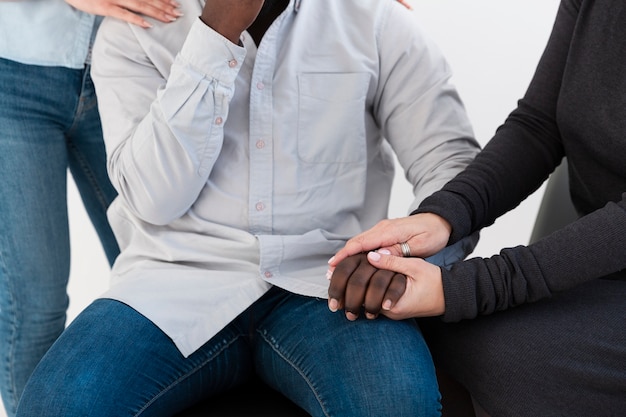New Resources for Crime Victims: A Comprehensive Guide

New Resources for Crime Victims: A Guide to Support and Assistance Programs in the US provides essential information on victim compensation, counseling services, legal assistance, and support groups, empowering individuals to navigate the aftermath of crime with available aid.
Navigating the aftermath of a crime can be overwhelming, leaving victims feeling lost and unsure where to turn. This guide, New Resources for Crime Victims: A Guide to Support and Assistance Programs in the US, aims to provide a comprehensive overview of the available resources and support systems designed to help victims recover and rebuild their lives.
Understanding Victim Compensation Programs
Victim compensation programs are a crucial resource for crime victims, offering financial assistance to cover expenses incurred as a direct result of the crime. These programs are typically state-funded and have specific eligibility requirements and limitations.
These programs address the financial burden that often accompanies victimization, such as medical expenses, lost wages, and even funeral costs.
Eligibility Requirements
To be eligible for victim compensation, applicants generally need to meet certain criteria. Understanding these can help victims navigate application processes and secure the support they need.
- Report the crime to law enforcement within a specified timeframe.
- Cooperate with the investigation and prosecution of the offender.
- Demonstrate financial need based on the expenses incurred because of the crime.
- Suffer physical or emotional injury as a direct result of the crime.
Certain crimes may be excluded from compensation, such as those involving traffic offenses (except in cases of DUI resulting in injury) or crimes where the victim contributed to their victimization. Applicants must also adhere to state-specific deadlines for filing claims, which can range from one to three years from the date of the crime.
Covered Expenses
Victim compensation programs typically cover a range of expenses related to the crime, helping victims cope with various hardships.
- Medical expenses related to physical or psychological injuries.
- Lost wages due to injury or participation in the investigation.
- Funeral expenses in cases of homicide.
- Counseling and mental health services.

It’s important to note that compensation programs are often considered “payers of last resort,” meaning they generally cover expenses only after other sources, such as insurance or restitution from the offender, have been exhausted. Additionally, most programs have maximum award limits, which vary by state.
Victim compensation programs offer crucial financial assistance to crime survivors, helping them cover expenses like medical bills and lost income. These programs require cooperation with law enforcement and might require exhaustion of other compensation avenues.
Accessing Counseling and Mental Health Services
The emotional and psychological impact of crime can be profound, and accessing counseling and mental health services is essential for many victims. These resources provide a safe space for individuals to process their experiences and begin the healing process. The mental health and emotional needs of victims are often prioritized through specialized resources.
Support is designed to help them recover from trauma, anxiety, depression, and other mental health issues that may arise.
Types of Counseling Services
Different types of counseling services are available to meet the diverse needs of crime victims. Understanding your options and having choices is important to securing effective and tailored support.
- Individual Therapy: Provides one-on-one support to address personal trauma and challenges.
- Group Therapy: Allows victims to connect with others who have similar experiences, fostering a sense of community and shared understanding.
- Family Therapy: Helps families navigate the impact of crime on their relationships and dynamics.
Free or low-cost counseling services may be available through non-profit organizations, community mental health centers, and victim assistance programs. These avenues provide accessible and affordable mental health care for victims who might not otherwise be able to afford it.
Finding a Qualified Therapist
There are several key questions to consider when choosing a therapist as a crime victim. An appropriate therapist will increase the likelihood of recovery and healing after a traumatic event. When choosing make sure the selected professional has the correct credentials to help you.
- Check their credentials and licenses to ensure they are qualified.
- Inquire about their experience working with crime victims and trauma.
- Ask about their therapeutic approach and how it aligns with your needs.
Many therapists offer free initial consultations, which provide an opportunity to discuss concerns and assess whether the therapist is a good fit. Additionally, online directories and referral services can help you find therapists specializing in trauma and victim support.
Accessing counseling and mental health services is critical to the overall well-being of crime victims, providing them with the tools and support needed to heal and rebuild their lives. A range of services, including individual, group, and family therapy, are available to meet diverse needs. To choose a therapist, consider specific needs and ensure that the selected candidate has appropriate credentials.
Legal Assistance and Advocacy
Navigating the legal system can be complex and overwhelming for crime victims. Legal assistance and advocacy programs provide critical support in understanding legal rights, navigating court proceedings, and advocating for justice.
These services empower victims to participate effectively in the legal process and ensure their voices are heard.
Understanding Your Rights
Crime victims have certain legal rights that are protected by law. Knowing these rights is essential for ensuring fair treatment and access to justice. There are several elements to take into consideration when making sure that your rights are upheld.
- The right to be informed of court proceedings and hearings.
- The right to be present at court proceedings.
- The right to be heard at sentencing and parole hearings.
These rights can vary by state and type of crime. Legal assistance programs provide information and guidance on victims’ rights, helping individuals understand their options and how to assert their rights throughout the legal process.
Finding Legal Representation
Legal representation can be invaluable for crime victims involved in court proceedings, such as trials or restitution hearings. There are several ways that a legal professional can provide legal representation in court.
- Private Attorneys: Offer legal services on a fee basis, providing personalized representation and advocacy.
- Legal Aid Organizations: Provide free or low-cost legal services to eligible low-income victims.
- Victim Advocacy Groups: Offer support and guidance in navigating the legal system, often partnering with attorneys to provide legal representation.

When choosing legal representation, it’s essential to consider experience in victim advocacy and criminal justice. Additionally, it’s crucial to understand the costs involved and any limitations on the scope of representation.
Legal assistance and advocacy programs play a vital role in supporting crime victims through the legal system, ensuring their rights are protected and their voices are heard. By understanding their rights and accessing legal representation, victims can effectively navigate court proceedings and advocate for justice.
Support Groups and Peer Support Networks
Connecting with others who have experienced similar traumas can be incredibly healing for crime victims. Support groups and peer support networks provide a safe and supportive environment, and allow individuals to share experiences, gain insights, and reduce feelings of isolation.
These networks can offer a sense of community and understanding that is often lacking in other areas of their lives.
Benefits of Peer Support
There are numerous distinct benefits when dealing with a peer support group. These advantages can help you feel more supported in your community.
- Reduced feelings of isolation and loneliness.
- Increased self-esteem and empowerment.
- Improved coping skills and emotional resilience.
- Shared experiences and mutual understanding.
Participating in support groups can help victims feel less alone in their struggles, empowering them to connect with others who understand their pain. Sharing experiences can validate feelings and provide valuable insights into coping strategies.
Finding Support Groups
Support groups can be found through various avenues, including:
- Victim assistance programs.
- Mental health centers.
- Non-profit organizations.
- Online communities.
When selecting a support group, it’s important to consider the focus of the group, the format (in-person or online), and the level of facilitation provided. Some groups are led by trained professionals, while others are peer-led. Compatibility with the group’s environment enhances the overall group experience.
Support groups and peer support networks are invaluable resources for crime victims, providing a sense of community, shared understanding, and increased coping skills. By connecting with others who have similar experiences, victims can reduce feelings of isolation and begin to rebuild their lives.
Online Resources and Information
The digital landscape offers a wealth of information and resources for crime victims. Various websites, databases, and online tools provide access to crucial information, support services, and legal guidance. These online resources can provide access to important and potentially life-saving resources.
These tools can be used to enhance safety, improve quality of life, and help crime victims.
Reliable Websites and Databases
Victims can consult a range of reputable websites and databases to find accurate and up-to-date information which can also contribute to their well-being.
- National Center for Victims of Crime: Offers information, resources, and advocacy for crime victims.
- Office for Victims of Crime: Provides federal resources and programs for crime victims.
- VictimConnect Resource Center: A helpline and online resource center connecting victims with services nationwide.
When using online resources, it’s crucial to verify the credibility of the source and ensure the information is accurate and reliable. Look for websites that are affiliated with reputable organizations or government agencies.
Online Safety Tips
Maintaining online safety is essential for crime victims, particularly those who have experienced cybercrime or online harassment. Several methods can be used to improve the virtual world.
- Use strong, unique passwords for online accounts.
- Be cautious when sharing personal information online.
- Monitor online activity for signs of harassment or stalking.
- Report cybercrime and online harassment to law enforcement and online platforms.
Additionally, victims should be aware of resources for removing personal information from the internet and protecting their privacy online. These tools and strategies can help prevent further victimization and ensure online safety.
Online resources and information provide crime victims with a wealth of support, legal guidance, and safety tips. By leveraging reliable websites, databases, and online safety measures, victims can access the information they need to navigate the aftermath of crime and protect themselves from further victimization.
Building a Safety Plan
Creating a safety plan is an essential step for crime victims, particularly those who are at risk of further victimization. A safety plan is a proactive strategy that outlines steps to take in case of an emergency or threat.
Having a well-thought-out safety plan can empower victims and increase their sense of control and security.
Key Components of a Safety Plan
A comprehensive safety plan should include the following components:
- Identifying potential threats and triggers.
- Developing strategies for staying safe in various situations.
- Establishing a support network of trusted friends, family, or professionals.
- Creating a list of emergency contacts and important phone numbers.
The safety plan should be tailored to the individual’s specific circumstances and needs. Victims should consider factors such as their living situation, work environment, and daily routines when developing the plan.
Practicing and Reviewing the Plan
It’s essential to practice and review the safety plan regularly to ensure it’s effective and up-to-date. A safety plan is effective because it is built on several components and continuously reassessed as conditions change.
- Rehearse the plan with trusted friends or family members.
- Update the plan as needed to reflect changes in circumstances.
- Keep a copy of the plan in a safe and accessible location.
Victims should also be aware of resources for obtaining protection orders or restraining orders, which can provide additional legal protection against an abuser or perpetrator. These legal measures can help create a safer environment and deter further victimization.
Building a safety plan is a proactive step that crime victims can take to protect themselves from further victimization. By identifying potential threats, developing strategies for staying safe, and establishing a support network, victims can increase their sense of control and security.
| Key Point | Brief Description |
|---|---|
| 💰 Victim Compensation | Financial aid for medical bills, lost wages & funeral costs. |
| 🤝 Counseling Services | Therapy for trauma, anxiety, and emotional recovery. |
| ⚖️ Legal Assistance | Guidance on rights, representation in court, and advocacy. |
| 🫂 Support Groups | Connections with others who share similar experiences. |
Additional support for crime victims, including resources and programs, can play a vital role in their recovery journey. This journey includes a diversity of options, including recovery programs and resources to promote health and well-being.
Frequently Asked Questions
▼
Victim compensation is financial aid to cover costs from the crime, like medical bills and lost wages. It helps ease the financial strain during your recovery, ensuring you can access essential services. However, you generally need to report the crime to law enforcement to be eligible.
▼
Look for nonprofits, community mental health centers, and victim assistance programs that offer free or low-cost counseling. Many therapists provide initial free consultations to see if they’re a good fit. Check online directories for trauma-specialized therapists as well.
▼
You have the right to be informed of court proceedings, to be present at hearings, and to be heard at sentencing. These rights vary by state and crime type. Legal assistance programs can guide you on your rights and how to protect them.
▼
Support groups connect you with others who have gone through similar experiences, reducing isolation and increasing self-esteem. Sharing and mutual understanding offer insights and coping strategies. Connecting can validate your feelings and is highly benefical.
▼
Include potential threats, strategies for staying safe in different situations, a support network, and emergency contacts. Tailor it to your specific circumstances and practice it regularly. Protection or restraining orders can provide legal protection, ensuring your safety.
Conclusion
Accessing the right resources is crucial for crime victims navigating the aftermath of their experiences. From financial assistance and mental health support to legal aid and peer networks, a variety of programs are available to help victims heal and rebuild their lives. By understanding these resources, crime victims can feel empowered and take steps towards a brighter future.





